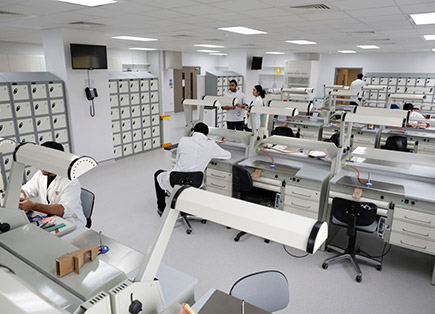Study options
- Starting in
- September 2025
- Location
- Whitechapel
- Fees
- Home: £34,150
Overseas: £63,250
EU/EEA/Swiss students
The course fee is charged per annum for 3 years. Note that fees may be subject to an increase on an annual basis - see details on our tuition fees page.
What you'll study
If you’re a dentist who wants to specialise in periodontology either in primary or secondary services, or become a clinical academic, this course is for you. The Professional Doctorate in Periodontology provides you with an integrated three-year training programme, so you can gain high-level research expertise alongside your specialist clinical training.
This DClinDent programme will expand your knowledge and skills in periodontics and provide an excellent preparation for your career as a specialist in this field.
You’ll take a programme of seminars and practical classes, starting with an introductory course to review the clinical and scientific scope of periodontics and determine its evidence base.
You’ll then enter supervised clinical and, as appropriate, laboratory practice, conducting treatment planning and clinical procedures, including a number of complex treatments. In this way, you’ll gain hands-on training in non-surgical and surgical periodontal therapy, including regenerative, mucogingival surgery and implant dentistry. You’ll also acquire specialist, practical knowledge of innovative and evidence-based clinical practice in periodontics and implant dentistry.
You’ll complete a clinical audit or service evaluation project to review clinical practices. Your research investigation will lead to a dissertation, where you’ll demonstrate the application of scientific method to a periodontic problem. You’ll gain advanced research skills to professional doctorate level.
In addition to your studies, you’ll also have a chance to interact with external specialists, through an extensive seminar series held within the Institute of Dentistry, the Blizard Institute and Queen Mary as a whole.
Structure
• Three compulsory research modules, including your final dissertation (up to 50,000 words)
• Three compulsory knowledge and clinical skills modules
Compulsory/Core modules
This module covers the basic biological science topics, operative and clinical skills to ensure that all students possess a fundamental level of skills, which will then be used and built on over the following two years of clinical training and practices that are relevant to periodontics and restorative care.
This module covers aspects of research methodology, ethics and other transferable skills to ensure students are introduced to issues in research, such as governance issues and statistical analysis of clinical research. The research project undertaken in this course will give the student a real insight into the philosophy of research as well as practical experience in the process of completing a piece of original work. It also covers evidence based dentistry for the students to maintain their clinical portfolio.
This module builds on the knowledge acquired in module Research I to enable students to carry out an independent research project and to write a report on their research, and to conduct a service evaluation through the completion of a clinical service audit. This module develops the skills and experience required for module Research III.
This final module in the programme enables students to demonstrate their ability to complete an independent research project and to write a thesis on their research, and the acquisition of advanced skills for service evaluation through the completion of a clinical service audit.
This core module will consolidate the basic knowledge acquired in previous modules and introduce students to the more in-depth aspects of Periodontics, including Regenerative, Mucogingival surgery , Implant Dentistry and the knowledge required to manage cases needing more complex intervention such as those requiring treatment with or for dental implants, cleft palate, oral cancer or hypodontia. This module also enhances the student's ability to examine the patient, in diagnosis of presenting condition, and to formulate an appropriate treatment plan. This module will cover aspects of advanced knowledge in Periodontics and advanced clinical skills that form part of specialist training in Periodontics and Restorative Dentistry.
This module covers all aspects of periodontics to a specialist level and consolidates advanced clinical skills. It will cover integrated knowledge obtained from the previous two years and its application to clinical practice. This module will also cover aspects of periodontic care in relation to other dental and medical specialties and provide clinical training on basic and multi-disciplinary approaches on diagnosis and treatment planning for adults needing comprehensive oral rehabilitation.
Assessment
• Each module is assessed separately, including essays, written, clinical and viva voce examinations
• You will also be assessed by case presentations and clinical, diagnostic and treatment planning
• You will be assessed through your dissertation and research projects
Dissertation
The dissertation forms a major component of your degree. You’ll write a final report of up to 50,000 words on your research project.
Teaching
You'll be taught through a combination of expert seminars, supervised clinical and laboratory sessions, one-to-one tutorials, self-directed learning, case presentations and reading. You'll also be taught relevant laboratory methodology.
Your individual study time could be spent preparing for, or following up on, formal study sessions, reading, producing written work, completing projects and revising for examinations.
The direction of your individual study will be guided by the formal study sessions you attend, along with your reading lists and assignments.
You will be assigned an Academic Adviser who will guide you in both academic and pastoral matters throughout your time at Queen Mary.
This professional doctorate programme includes weekly teaching and clinical contact hours in addition to numerous hours of independent learning and research. Please contact the course convenor for information on the number of contact hours per week for this programme.
Where you'll learn
Facilities
New postgraduate study and research facilities are available in the state of the art Blizard building, as well as the Institute of Dentistry, and include:
• 11 dedicated seminar rooms and a student learning centre
• 92 production laboratory spaces
• Digital imaging and two cutting-edge cone beam CT machines
• A PC in every operatory with ‘slave screen’ on chair for viewing images and discussing results with patient
• Modern facial-scanning equipment
• Facilities and services for 72 ‘phantom’ heads
Watch our video to see more of our facilities.
Campus
Your postgraduate learning experience is enhanced by our fantastic location in Whitechapel, in east London.
Not only are we in one of the capital’s most vibrant areas to live and work but we also serve a diverse local community, with 92 different languages spoken by the borough’s 300,000 residents. You will develop your clinical skills and knowledge while caring for this community. Moreover, the Institute offers you many exciting opportunities to develop an understanding of health and the treatment of disease in a global and international context.

About the Institute
Institute of Dentistry
If you study with us, you will join a dynamic, successful dental school with a first-class reputation: Queen Mary has consistently been ranked in the top 20 in the World for dentistry in the QS World University Rankings by Subject and we were ranked joint first in the country for research environment for dentistry in the most recent national assessment (REF 2021).
The Institute of Dentistry is a special place to undertake your postgraduate studies. We bring together a number of world-leading researchers in basic and clinical sciences who supervise research students in the fields of oral medicine, oral pathology, oral microbiology, oral epidemiology, oncology, dental biomaterials, dental biophysics, dental public health, dental education, periodontology, orthodontics, paediatric, prosthetic and conservative dentistry.
The Institute is based in Whitechapel and offers cutting-edge technology, a superb education and first-class research facilities.
The Institute of Dentistry is part of Queen Mary’s Faculty of Medicine and Dentistry. Queen Mary is part of the University of London and a member of the Russell Group.
Career paths
This DClinDent programme will provide you with an excellent preparation for your career as a dentist with a special interest in periodontology.
You’ll also gain the research skills and experience necessary to pursue an academic career.
- 100% of Dentistry postgraduate-taught students are in employment or further study (2020/21)
- 100% of Dentistry postgraduate-taught students are in highly skilled work or graduate study (2020/21)
Fees and funding
Full-time study
September 2025 | 3 years
- Home: £34,150
- Overseas: £63,250
EU/EEA/Swiss students
Queen Mary alumni can get a £1000, 10% or 20% discount on their fees depending on the programme of study. Find out more about the Alumni Loyalty Award
Funding
There are a number of ways you can fund your postgraduate degree.
- Scholarships and bursaries
- Postgraduate loans (UK students)
- Country-specific scholarships for international students
Our Advice and Counselling service offers specialist support on financial issues, which you can access as soon as you apply for a place at Queen Mary. Before you apply, you can access our funding guides and advice on managing your money:
Entry requirements
UK
Degree requirements
Applicants must have a primary qualification in Dentistry (BDS or equivalent). Two years full-time post-qualification clinical practice of dentistry including evidence of specific relevant experience in periodontal care is also required.
Additional information
Please note that in order for your application to be considered you must have obtained a minimum IELTS score of 7.0 at the point of submission of your application.
Following the application deadline, screening of applications and selection of candidates will take place. Candidates who are shortlisted will be invited to attend an online interview with the Course Director.
Find out more about how to apply for our postgraduate taught courses.
International
English language requirements
The English language requirements for our programmes are indicated by English bands, and therefore the specific test and score acceptable is based on the band assigned to the academic department within which your chosen course of study is administered. Note that for some academic departments there are programmes with non-standard English language requirements.
The English Language requirements for entry to postgraduate taught and research programmes in the Institute of Dentistry fall within either English band 4 or English band 5. This programme requires the following English band:
Band 4: IELTS (Academic) minimum score 6.5 overall with 6.0 in each of Writing, Listening, Reading and Speaking
We accept a range of English tests and qualifications categorised in our English bands for you to demonstrate your level of English Language proficiency. See all accepted English tests that we deem equivalent to these IELTS scores.
Visas and immigration
Find out how to apply for a student visa.

